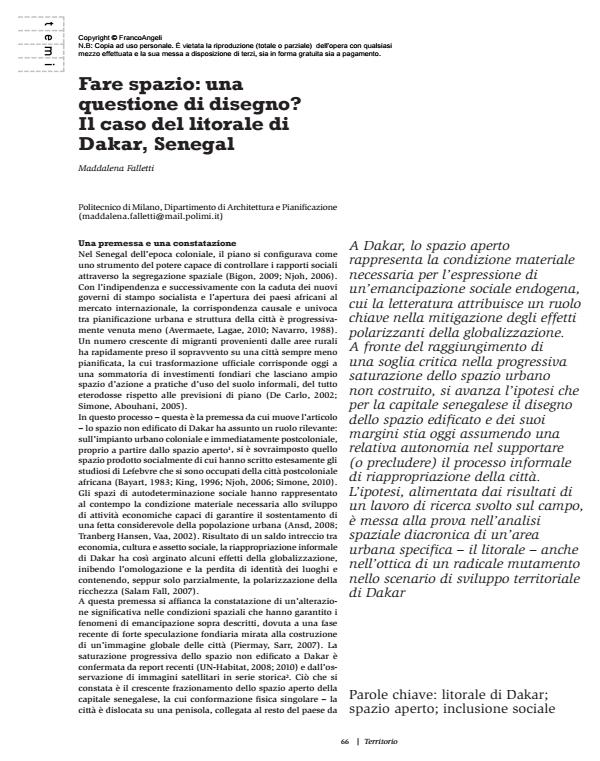Fare spazio: una questione di disegno? Il caso del litorale di Dakar, Senegal
Titolo Rivista TERRITORIO
Autori/Curatori Maddalena Falletti
Anno di pubblicazione 2012 Fascicolo 2012/61
Lingua Italiano Numero pagine 6 P. 66-71 Dimensione file 1968 KB
DOI 10.3280/TR2012-061011
Il DOI è il codice a barre della proprietà intellettuale: per saperne di più
clicca qui
Qui sotto puoi vedere in anteprima la prima pagina di questo articolo.
Se questo articolo ti interessa, lo puoi acquistare (e scaricare in formato pdf) seguendo le facili indicazioni per acquistare il download credit. Acquista Download Credits per scaricare questo Articolo in formato PDF

FrancoAngeli è membro della Publishers International Linking Association, Inc (PILA)associazione indipendente e non profit per facilitare (attraverso i servizi tecnologici implementati da CrossRef.org) l’accesso degli studiosi ai contenuti digitali nelle pubblicazioni professionali e scientifiche
In Dakar, open space represents the real condition necessary for the expression of endogenous social emancipation, attributed a key role by the literature in mitigating the polarising effects of globalisation. This paper advances the hypothesis that, faced with reaching a critical threshold in the progressive saturation of unconstructed urban space, the design of constructed space and its borders in the Senegalese capital today assumes relative autonomy in supporting (or precluding) the informal process of the reappropriation of the city. This hypothesis, supported by the results of research in the field, is tested by the diachronic spatial analysis of a specific urban area - the waterfront - in part from the perspective of a radical change in the scenario of the urban development of Dakar.
Parole chiave:Dakar waterfront; open space; social inclusion
Maddalena Falletti, Fare spazio: una questione di disegno? Il caso del litorale di Dakar, Senegal in "TERRITORIO" 61/2012, pp 66-71, DOI: 10.3280/TR2012-061011